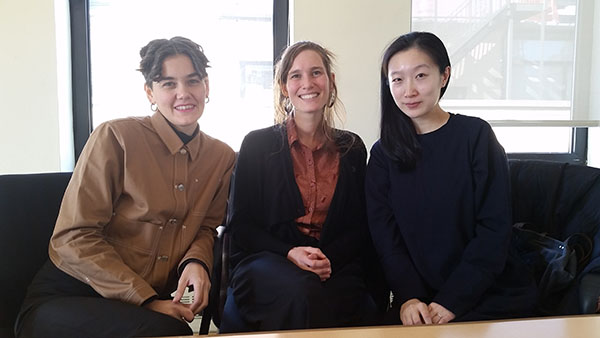
Onassis Foundation Fellowship Offers Philosophy Graduate Students at NSSR the Opportunity to Study Ancient Greek Thought
Since 2015, the Onassis Foundation Fellowship at The New School for Social Research (NSSR) has provided funding to PhD students in the Philosophy department who are focusing their studies on ancient Greek drama, philosophy, political theory, history, and poetry. Earlier this year, the foundation made a generous renewal grant — the only funding for graduate student work it provided in 2019.
The fellowship gave Yi Wu, PhD Philosophy ’18, Teresa Casas Hernandez, PhD Philosophy ’20, and Angelica Stathopoulos, PhD Philosophy ’20, three years’ funding, including stipends, tuition scholarships, and travel funds that enabled them to spend time in Greece.
Speaking about the importance of the funding, Casas Hernandez said, “It gave us a space — there had been no identified space for ancient Greek studies. It helped identify this current and made it visible and gave visibility to work that was somehow not getting lost but not being properly seen. The Onassis Foundation funding gives an opportunity to students like myself. I would never have been able to do my thesis without it.”
Casas Hernandez, who lives in Madrid, is also an actor and has been working on a dissertation on the link between ancient Greek theater, of the fourth and fifth centuries BCE, and modern Greek theater, of the period between 2004 and 2015. She analyzes the Western concept of theater, as represented by Plato’s Republic and Aristotle’s Poetics, with the goal of showing that the chance and memory, two elements that the philosophers exclude, are essential to theater.
During her stay in Greece, Casas Hernandez conducted research at the Onassis Stegi Theatre in Athens. She was given access to the theater’s extensive archives and to an array of working theater professionals, including well-known artists such as Euripides Laskaridis and Prodromos Tsinikoris, whom she interviewed for her research.
Stathopoulos has a personal connection to the study of ancient Greece: Although she grew up in Sweden, her father is Greek.
“A lot of the time in Northern Europe, where I grew up, we tend to be very fond of ancient Greece, but we disregard modern Greece,” she said when discussing the importance of spending time in the country. “Traveling to modern Greece is important no matter what it is you end up doing, and it’s important to be attentive to the relationship between the ancient and the modern. Maybe it sounds romantic, but being in Greece was very conducive to doing my work.”
Stathopoulos’ research examines the ontological roots of passivity and is intended to restore the “dignity of passivity,” a quality that she says is often disparaged in the West. Drawing on philosophical perspectives ranging from Aristotle’s theory of potentiality, to feminist philosophy and queer theory, the work is designed to “demonstrate the importance of passivity for re-imagining ourselves and our shared world.”
Yi’s dissertation, titled “The Sea and the Mirror,” traces the symbolic presence of the sea from Plato to Heidegger, using it as a way to understand the drive of philosophy as “both response to and moment within the impetus of Western colonization.”
After completing her dissertation in May, Yi took a trip to Greece, which she called a “magical experience.” She discovered that the reality of modern Greece was quite different from what she had imagined from studying the ancients. She and the other scholars agree that their study of the ancients has great relevance for modern society.
“The ocean in contemporary society is looming large on the horizon because of the environmental crisis and global warming,” she says. “It has a geopolitical dimension — less physical reality than how we relate to the elements — and is a reflection of how we relate to our own historical selves.”
Casas Hernandez says that her dream is to find a job as a curator in charge of cultural content of an institution. Yi is considering teaching positions in philosophy. Stathopoulos, who now lives in Denmark, would like to publish and teach. All three hope to have their dissertations published as books.
The three scholars expressed gratitude for the assistance of their advisors and professors at The New School, Casas Hernandez compared meeting with Simon Crtichley, Hans Jonas Professor of Philosophy and director of the fellowship, to “visiting the oracle” of ancient Greece. She says he gave suggestions that lead her work in a direction that she ultimately wanted but didn’t know how to formulate.
Stathopoulos credits philosophy professor Dimitri Nikulin helping her feel more comfortable writing in her own voice and offering her own interpretations of the texts, rather than relying on outside sources. She says that her meetings with Critchley were extremely encouraging and that he helped her “go with her gut feeling” and develop her work.
Yi worked with both Critchley and Nikulin as well as philosophy professor James Dodd and Richard Bernstein, the Vera List Professor of Philosophy. She says that by applying the Socratic method, Bernstein was able to make her feel more comfortable and that Dodd’s extensive knowledge “informed her scholarship and critical approach.”
“The ancient Greeks hold a mirror up to us,” says Critchley. “Their struggles and crises are extraordinarily relevant to those of our times. The Onassis Foundation has fundamentally changed the lives and academic careers of our first six fellows, who are drawing innovative connections between ancient and 21st-century thought. I am immensely grateful for the opportunity to lead this fellowship for four more years and for the foundation’s ongoing support of this new generation of emerging scholars.”